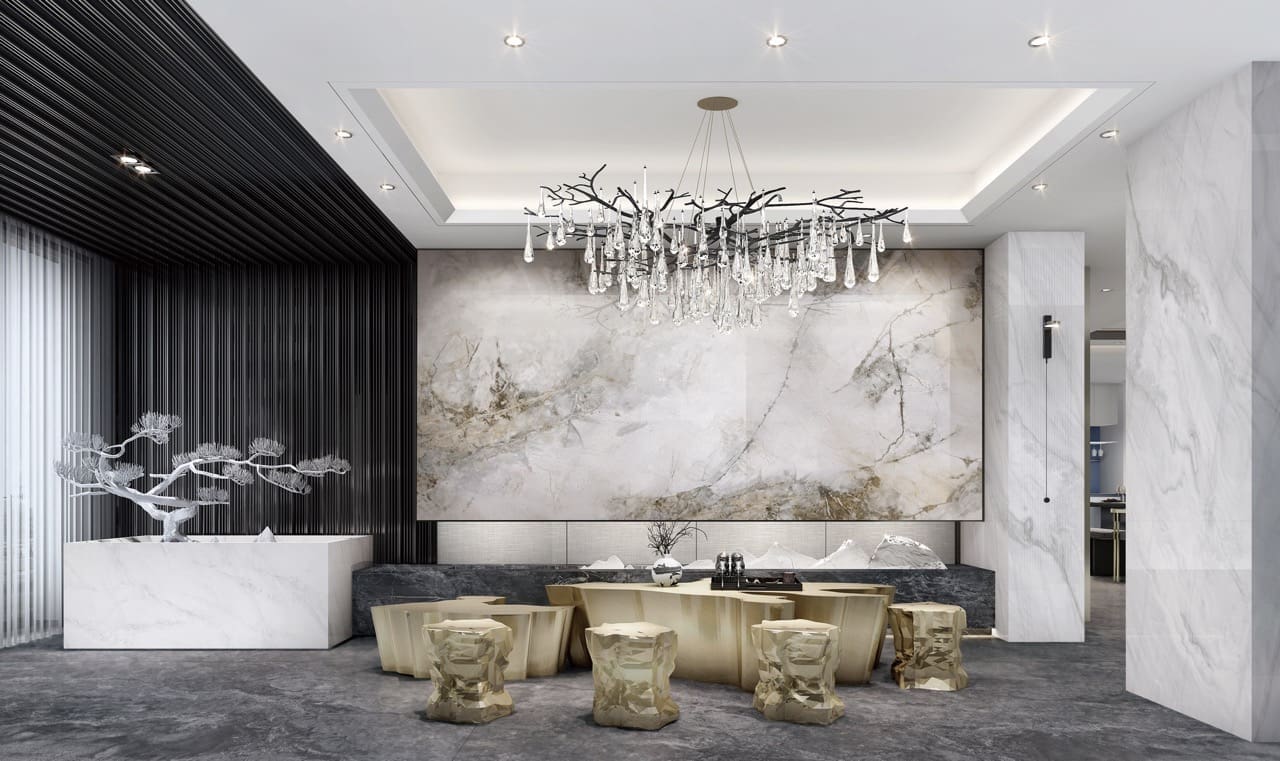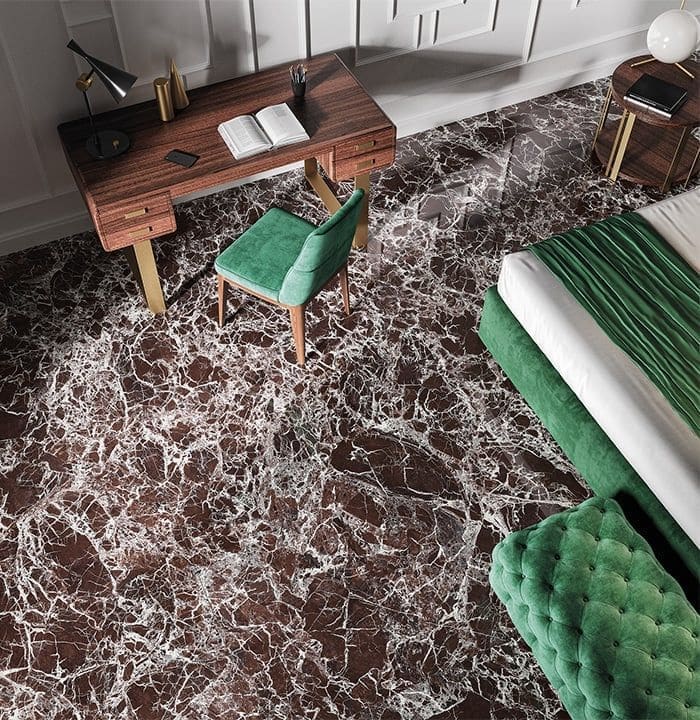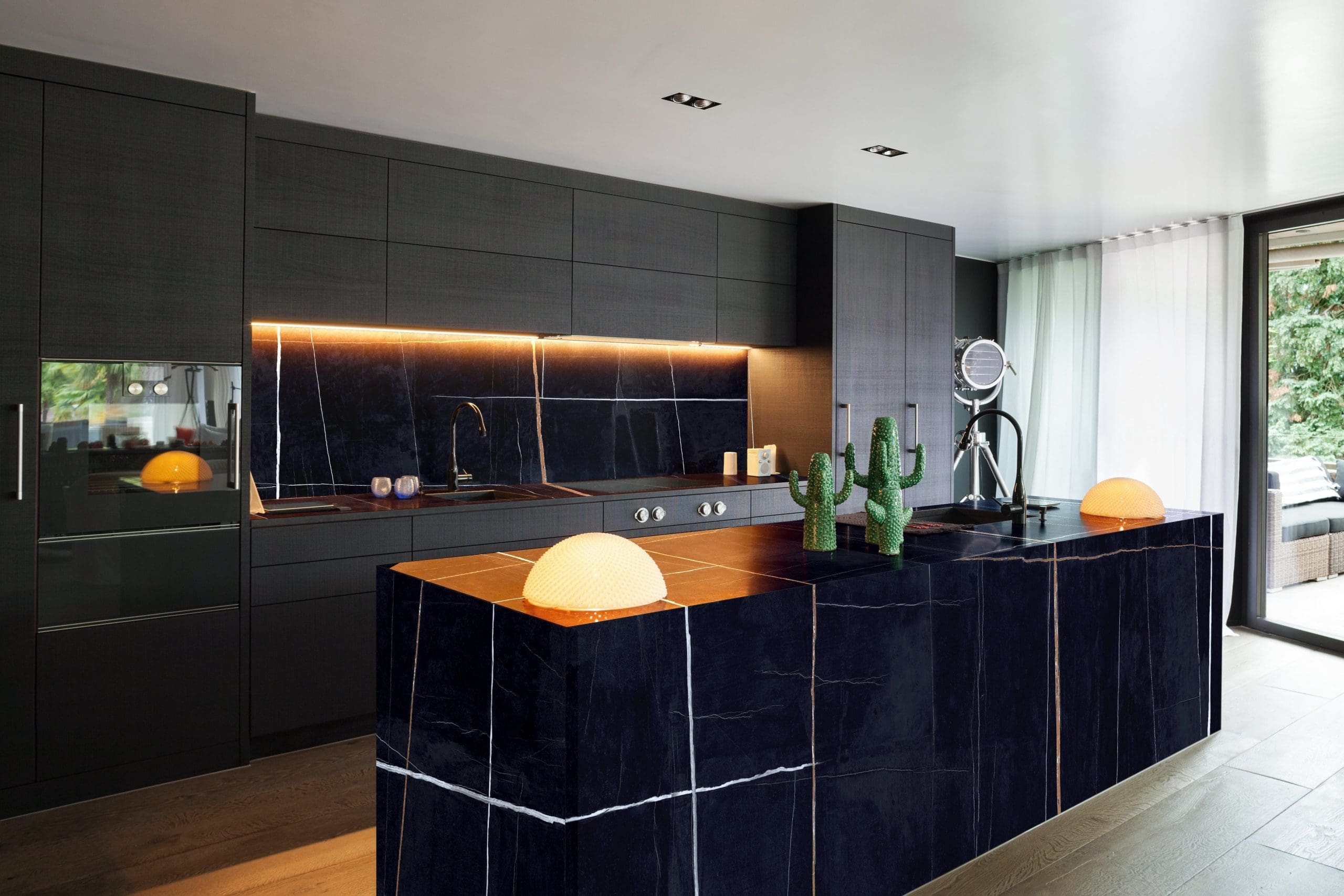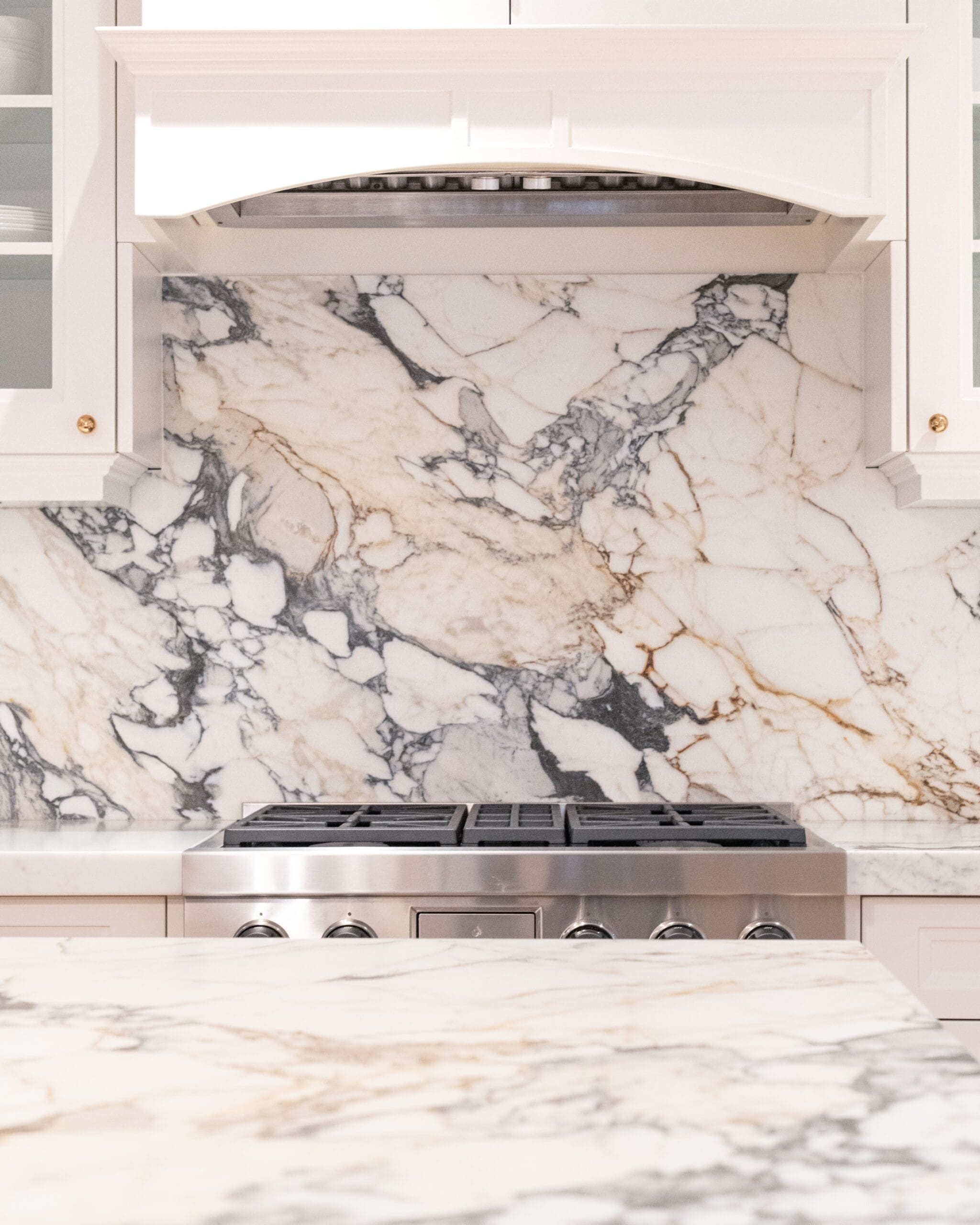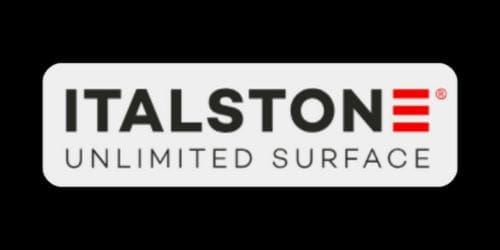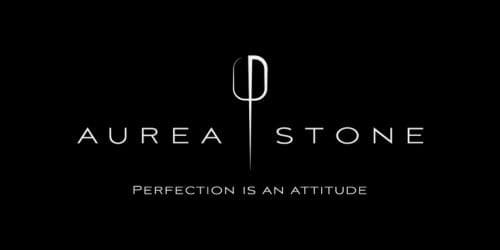Quartz vs Quartzite: The Ultimate Guide
Choosing the perfect material for your countertops, flooring, or other surfaces can feel like navigating a jungle of options – you want something stunning, durable, and easy to live with. Enter quartz and quartzite, the two popular options known for their blend of elegance and toughness. Often confused at first glance, these materials have distinct personalities.
Quartz is the engineered wonder, offers a rainbow of colors and consistent patterns, perfect for design flexibility. Quartzite, the natural beauty, boasts unique veining and incredible strength. This guide explores their fascinating differences, helping you find the perfect match for your project.
Understanding Natural Stone and Engineered Stone
What are Quartz and Quartzite?
- Quartz: Imagine tiny quartz crystals mixed with resins and pigments. This manufacturing process allows for a vast array of colors and patterns, making quartz highly versatile.
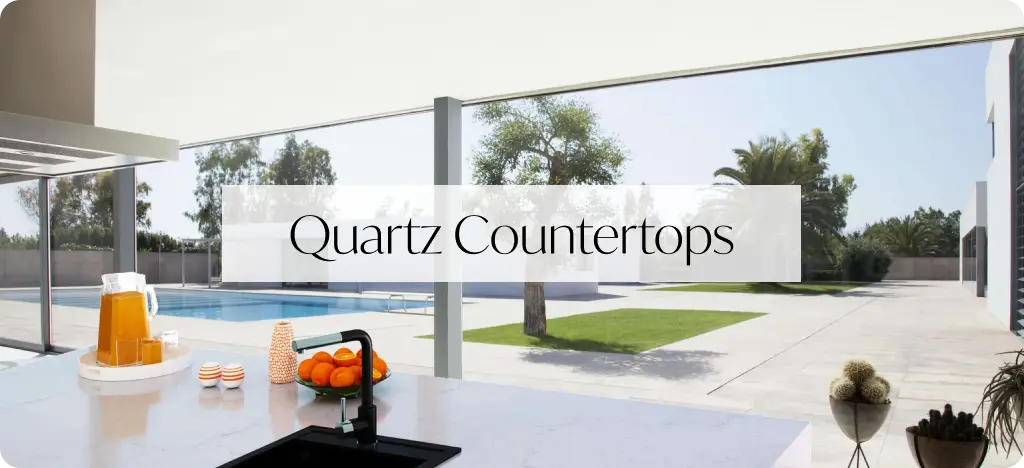
- Quartzite: Picture sandstone transformed under intense heat and pressure. This natural process creates a dense, durable stone often resembling marble.

How are They Formed?
- Quartzite: Millions of years of geological processes. Sandstone, rich in quartz, undergoes extreme heat and pressure, causing the quartz grains to recrystallize and form a tightly bonded stone. This natural formation is responsible for quartzite’s unique appearance and exceptional hardness.
- Quartz: Being man-made, involves combining ground natural quartz with polymer resins and pigments. This process allows manufacturers to create a wide variety of designs and colors, making quartz a chameleon for various design styles.
Click here to browse our extensive selection of Quartz slabs.
Key Differences Between Quartz and Quartzite Countertops
| Aspect | Quartz | Quartzite |
| Composition | Engineered stone | Natural stone |
| Formation Process | Made from ground quartz crystals combined with resins and pigments | Formed from sandstone under high heat and pressure |
| Appearance | More design options. Consistent colors and patterns, customizable | Unique, natural variations in color and veining |
| Durability | Durable, resistant to scratches and impacts | Extremely hard, more resistant to heat and scratches |
| Heat Resistance | Moderate, can be damaged by excessive heat | Excellent, withstands high temperatures |
| Maintenance | Low maintenance, no sealing required | Requires regular sealing to prevent staining |
| Stain Resistance | Non-porous, highly resistant to stains | Can be stain-resistant with proper sealing |
| Cost | Generally more affordable | Typically more expensive |
| Color Options | Wide range of colors and patterns available | Limited to natural colors, primarily whites, grays, and beiges |
| Installation | Easier to fabricate and install | More challenging and costly to work with |
| Usage | Ideal for kitchen countertops, bathroom vanities, backsplashes | Suitable for countertops, flooring, and feature walls |
View our selection of Quartzite slabs and discover the perfect quartzite slab for your project.
Pros and Cons of Quartz and Quartzite
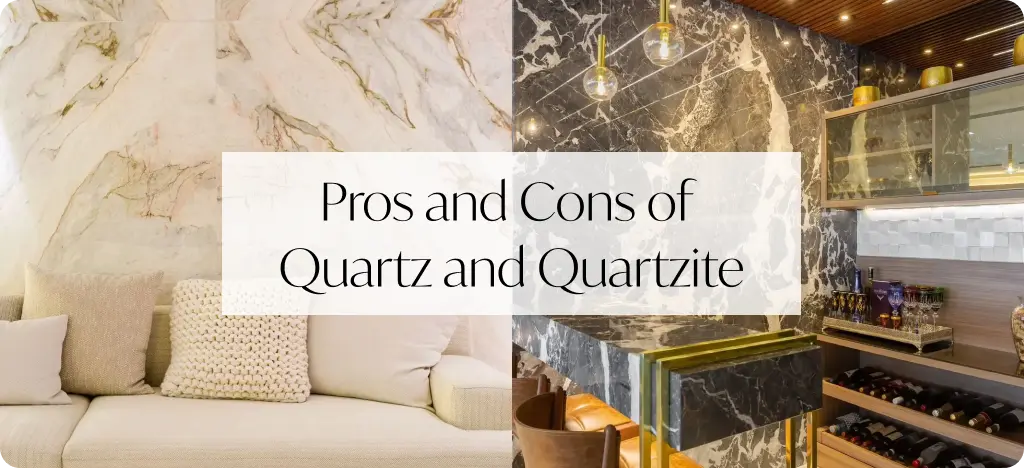
Quartz
- Pros: Versatile with a wide range of colors and patterns, low maintenance, non-porous surface resists stains and bacteria, consistent appearance for a seamless look.
- Cons: Sensitive to high heat, can fade or yellow with prolonged sun exposure, lacks the unique charm of natural stones, limited by color options compared to engineered stones.
Quartzite
- Pros: Exceptional hardness and durability, excellent heat resistance, natural beauty with unique veining patterns, can be highly stain-resistant with proper sealing.
- Cons: Requires regular sealing to maintain stain resistance, generally more expensive than other countertop materials.
Aesthetic and Design Considerations
Quartz: The Adaptable Artistry of Countertops
Quartz offers a kaleidoscope of colors and patterns, mimicking the look of marble, granite, or even creating entirely unique designs. Its non-porous surface and consistent coloring make it ideal for countertops, backsplashes, and even wall cladding, seamlessly integrating into any design scheme.
Quartzite: Nature’s Timeless Beauty
Each quartzite slab tells a unique story with variations in color and veining. You’ll find gorgeous shades of white, gray, and beige, often with stunning veining patterns. While its color options are limited compared to quartz, quartzite’s natural elegance brings a touch of nature’s artistry to your home.
Modern vs. Traditional: Choosing Your Style
Quartz aligns perfectly with modern and contemporary designs, offering a clean and sophisticated look. Quartzite, with its natural charm, enhances traditional, rustic, or luxurious spaces with its elegant patterns. Ultimately, choose the material that speaks to your style and design vision.
Want to explore the design possibilities of quartz and quartzite? Visit our Toronto showroom today!
Performance and Durability
Hardness and Scratch Resistance
- Quartz: Incredibly durable, thanks to its engineered composition. It resists scratches and impacts well.
- Quartzite: One of the hardest natural stones, even surpassing granite. This exceptional hardness makes it highly resistant to scratches and abrasions, ideal for high-traffic areas.
Heat Resistance Comparison
- Quartz: Can withstand moderate heat, but excessive heat can damage the resin used in its composition. Use trivets or hot pads to protect quartz countertops from hot pots and pans.
- Quartzite: Due to its natural formation process, quartzite boasts excellent heat resistance. It can withstand high temperatures without damage, making it a superior choice for kitchen countertops and fireplaces.
Stain and Chemical Resistance
- Quartz: The non-porous surface of quartz makes it highly resistant to stains and chemical damage. Spills can be easily wiped away without penetrating the surface, making quartz a low-maintenance option.
- Quartzite: While naturally more porous than quartz, quartzite can be sealed to enhance its stain and chemical resistance. Regular sealing is recommended to maintain its protective barrier and ensure long-lasting beauty.
Cost and Budgeting for Your Countertops

Price of Quartz vs Quartzite
The cost of quartz and quartzite can vary significantly based on factors such as quality, color, and brand. Generally, quartz tends to be more affordable than quartzite. High-end quartz can be more expensive than basic quartzite, but overall, quartz is usually the more budget-friendly option.
Factors Affecting Cost
Several factors can influence the cost of quartz and quartzite, including:
- Quality and Grade: Higher quality stones with fewer imperfections will be more expensive.
- Size and Thickness: Thicker slabs will cost more due to the additional material.
- Brand and Origin: Renowned brands and stones sourced from distant locations can increase costs.
- Installation Complexity: Custom shapes, edges, and intricate installations can add to the overall cost.
Long-Term Value and Investment
While quartz has a lower upfront cost, quartzite’s superior durability and heat resistance offer better long-term value. Investing in high-quality stone enhances property value and minimizes future replacements or repairs.
Maintenance and Care
Cleaning and Upkeep
- Quartz: Requires minimal maintenance. Its non-porous surface doesn’t need sealing and can be cleaned with mild soap and water. Avoid abrasive cleaners.
- Quartzite: Needs regular sealing to prevent stains and should be cleaned with gentle cleaners to preserve its beauty.
Potential Issues
- Quartz: Can be damaged by heat and UV exposure; use trivets and window treatments to protect it.
- Quartzite: The primary concern is its porosity; it requires regular sealing and prompt spill cleaning to prevent stains. Use cutting boards and avoid heavy impacts to prevent chipping.
Lifespan and Durability Over Time
Both quartz and quartzite countertops are outstanding choices for longevity. Quartz countertops can last between 20-60 years, while quartzite countertops can endure for 50-100 years, thanks to their natural hardness and resistance. Both materials are incredibly durable, making them a long-lasting investment for your home. Additionally, installing quartz or quartzite countertops can significantly boost the resale value of your kitchen. Prospective buyers are often drawn to these surfaces due to their durability, low maintenance, and aesthetic appeal, making your kitchen a standout feature in the housing market.
Ready to discuss your project and get a free quote for your quartz or quartzite countertops? Call us today!
Applications in Interior and Exterior Design

Popular Uses in Residential Projects
- Quartz: A popular choice for kitchen countertops, bathroom vanities, and backsplashes due to its wide range of colors and patterns.
- Quartzite: Often used in high-end homes for kitchen countertops, flooring, and feature walls. Its natural beauty and durability make it a luxurious option.
Applications in Commercial Spaces
- Quartz: Ideal for commercial applications like hotel lobbies, office buildings, and restaurants due to its durability, low maintenance, and consistent appearance.
- Quartzite: Used in commercial settings where a premium, natural look is desired. Its hardness and heat resistance are valuable in high-traffic areas.
Trends in the Greater Toronto Area
In the Greater Toronto Area, there’s a growing trend towards using quartz and quartzite for both residential and commercial projects. Homeowners and professionals alike appreciate the blend of aesthetics and performance these materials offer.
Environmental Impact and Sustainability
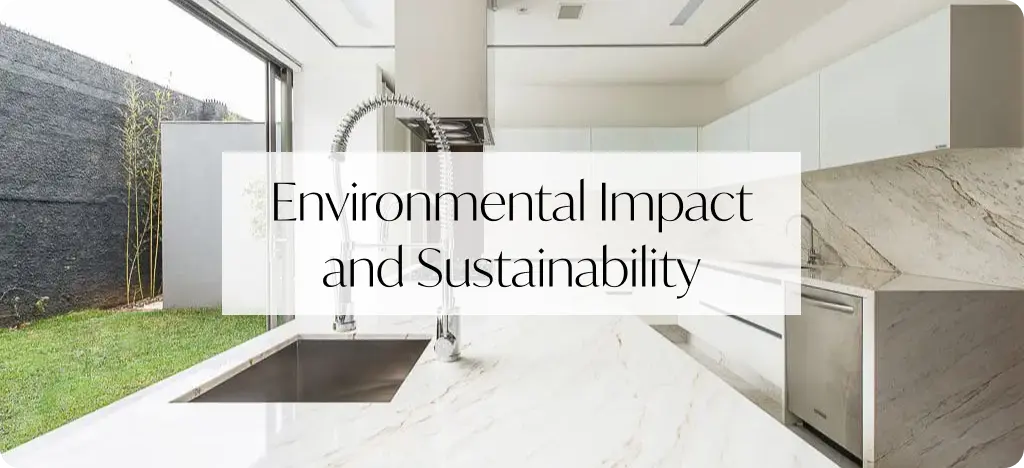
Sourcing and Manufacturing Processes
- Quartz: Engineered from natural quartz crystals, but its manufacturing process involves resins and pigments. Some brands focus on environmentally friendly practices, including recycling water and reducing emissions.
- Quartzite: A natural stone extracted from quarries. Responsible sourcing and minimizing environmental impact are important considerations when choosing quartzite.
Eco-Friendliness of Quartz and Quartzite Countertops
- Quartz: Often seen as the more eco-friendly option due to its lower energy requirements and availability of products made with recycled materials. Opting for quartz with low-VOC resins can further minimize environmental impact.
- Quartzite: While naturally formed and free from synthetic materials, its extraction and transportation have environmental considerations. Sourcing from suppliers who prioritize sustainable and ethical practices is crucial.
Both materials can be environmentally friendly if responsibly sourced and manufactured, with quartz offering a more controlled impact and quartzite needing careful extraction practices.
Expert Opinions and Recommendations
Insights from Fabricators and Designers
Fabricators and designers often recommend quartz for its versatility and low maintenance. Its consistent quality and ease of installation make it a favorite among professionals.
Quartzite, while more challenging to work with due to its hardness, is highly praised for its natural beauty and durability. Designers often choose quartzite for high-end projects where aesthetics are paramount.
Case Studies and Real-World Examples
Several high-profile projects in the Greater Toronto Area have successfully incorporated quartz and quartzite. For instance, luxury condos and custom homes often feature quartzite countertops for their unique patterns, while commercial spaces prefer quartz for its practicality.
Professional Tips for Choosing the Right Material

When selecting between quartz and quartzite, consider these tips from industry professionals:
- Assess Your Needs: Identify your project’s requirements, including aesthetics, durability, and budget. Choose quartz for low-maintenance, water-resistant, and durable surfaces. Opt for quartzite for a unique, natural look and if you’re willing to do regular maintenance.
- Consult Experts: Fabricators and designers can provide valuable insights on material selection, fabrication, and installation specific to your project.
- Sample and Compare: Viewing samples in person helps you understand each material’s appearance, texture, and how it interacts with light. Visit our Toronto showroom today to explore our stunning selection of quartz and quartzite countertops!
- Consider Maintenance: Think about the upkeep required for each material and choose one that fits your lifestyle. Quartz requires minimal maintenance, while quartzite needs regular sealing.
Choosing the Best Countertop for Your Kitchen
When deciding between quartz and quartzite for your kitchen countertops, consider:
- Usage: Quartz is ideal for heavy use and easy cleaning, while quartzite offers a stunning natural look for less intensive use.
- Functionality: Quartz is non-porous and low-maintenance; quartzite requires sealing but is highly durable and heat resistant.
- Aesthetic: Quartz offers a wide range of colors and patterns; quartzite features unique veining and natural beauty.
- Cost: Quartz is generally more budget-friendly, while quartzite tends to be more expensive due to its natural extraction process.
Conclusion
In a nutshell, both quartz and quartzite are rock stars in the world of countertops and surfaces. Quartz is the versatile, low-maintenance, color-chameleon, perfect for those who want beauty without the fuss. On the other hand, quartzite is the natural beauty queen with heat resistance and toughness that could make a diamond blush.
By getting to know the unique personalities of these two materials, you’ll be well-equipped to choose the perfect match for your project. Whether you’re all about the aesthetics, need something that can take a beating, or are trying to keep an eye on the budget, quartz and quartzite have got you covered. So, go forth and rock your renovation with confidence!
FAQs
What are the main differences between Quartz and Quartzite?
Quartz is an engineered stone with consistent colors and patterns, while quartzite is a natural stone with unique, organic variations. Quartz is easier to maintain, while quartzite offers superior hardness and heat resistance.
Which is more durable, Quartz or Quartzite?
Both are highly durable, but quartzite is harder and more heat resistant, making it more suitable for high-traffic and high-heat areas.
How do the costs of Quartz and Quartzite compare?
Quartz is generally more affordable than quartzite, but prices can vary based on quality, brand, and installation complexity.
Can Quartzite withstand heat better than Quartz?
Yes, quartzite has excellent heat resistance and can withstand high temperatures without damage, unlike quartz, which can be affected by excessive heat.
What are the maintenance requirements for Quartz and Quartzite?
Quartz requires minimal maintenance and doesn’t need sealing. Quartzite needs regular sealing to maintain its stain resistance and should be cleaned with gentle cleaners.
Have more questions about quartz or quartzite countertops? Visit our FAQs page or contact Better Marble for expert advice and assistance.



